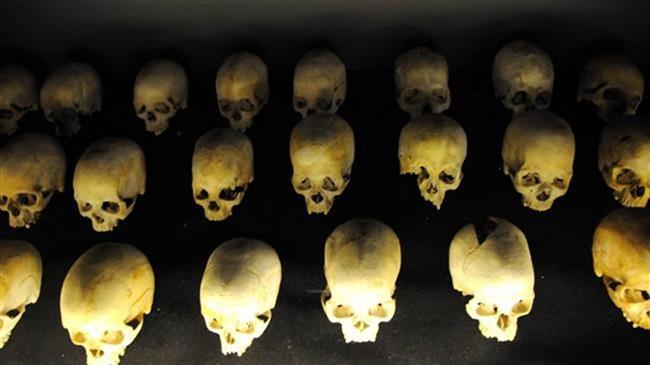
The skulls of the victims of the 1994 Rwandan genocide are displayed in the Kigali Genocide Memorial in Kigali, Rwanda, on April 7, 2012. (Photo by AFP)
The head of the African Union Commission has called on all Africans to commemorate the 26th anniversary of the Rwanda genocide, which claimed over one million lives, as efforts to bring key perpetrators to justice have so far failed.
Moussa Faki Mahamat made the plea on Tuesday after the Rwandan government announced last week that the commemoration would take place on April 7 but with limited events and participants due to the global coronavirus outbreak.
Although we will not be formally gathering at the African Union Commission for this event as usual, I encourage you to commemorate this day from wherever you are, Mahamat said in a statement.
I would like to pay tribute to the leadership and the people of Rwanda for consistently working towards ‘Never Again’ and for emerging through resilience and unity from the terrible past and putting Rwanda on a development path that continues to inspire many countries on our continent and beyond, he added.
The chairman of the African Union Commission went on to say that the anniversary would be an opportunity to reflect and continue to fight genocide and its ideology, denial, and impunity with a view to ensure that never again shall Africa experience such a heinous crime against humanity.
An estimated one million people, mostly from the Tutsi minority, were massacred over a span of 100 days in 1994 by Hutu extremists and militia forces in Rwanda.
The mass killing was triggered over an accusation by Hutus that the ethnic minority had assassinated Rwandan President Juvenal Habyarimana in April that year, when his plane was shot down in the capital, Kigali.
We should not be oblivious to the fact that genocide is always well planned, deliberately executed with impunity, yet genocide is also always followed by denial, Mahamat underlined.
The 26th anniversary of the genocide comes as Rwanda continues to grapple with the challenge of bringing to book key perpetrators of the 1994 killings.
The African country has issued at least 1,140 indictments and international arrest warrants for the genocide fugitives to 33 countries in Africa, Europe, North America, and Australia. Rwandan authorities, however, say there has been little cooperation and efforts to respond to Rwanda’s requests have been slow, especially in Africa.
The response towards our requests has not been forthcoming, it has been at a slow pace, especially in Africa where more than half of the indicted fugitives live, said Johnston Busingye, the Rwandan justice minister and attorney general, adding that only a few countries had been cooperative, mostly in Europe.
The cooperation by these countries has been multi-pronged; some have been arrested and extradited to Rwanda, others have decided to try the fugitives in their own courts, while others, where such fugitives have been naturalized as citizens, have been stripped of their nationalities and deported, Busingye said.
The Rwandan justice minister added that about 23 trials had been held abroad and about 24 fugitives had been brought back to the country.
Again, there is still some work to do with tracking other fugitives at large for trial, Busingye said, complaining that most of the host countries were politically motivated to give shelter to the suspects.
Highlighting the need for host countries to collaborate with justice institutions in Rwanda, he said, It is high time that all countries in general hosting fugitives put in place some mechanisms to either try the fugitives in their territories through their domestic jurisdiction or surrender them to Rwanda through extradition so that justice is dispensed without undue delay.
SOURCE: PRESS TV
LINK: https://www.ansarpress.com/english/15603
TAGS:






























 online news tv
online news tv




